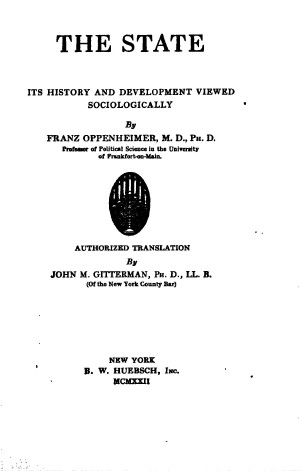
The State
- Franz Oppenheimer (author)
- John Milton Gitterman (translator)
A pioneering historical analysis of the state from a sociological perspective which focuses on the changing nature of political power and the groups who wielded this power. One of his key insights is the distinction between the economic and the political means of acquiring wealth.
Key Quotes
Origin of Government
There are two fundamentally opposed means whereby man, requiring sustenance, is impelled to obtain the necessary means for satisfying his desires. These are work and robbery, one’s own labor and the forcible appropriation of the labor of others… I propose in the following discussion to call one’s…
The State
What, then, is the State as a sociological concept? The State, completely in its genesis, essentially and almost completely during the first stages of its existence, is a social institution, forced by a victorious group of men on a defeated group, with the sole purpose of regulating the dominion of…